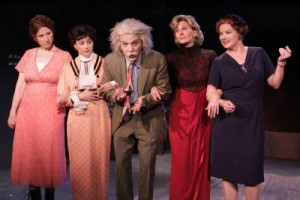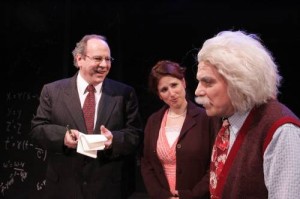RECOMMENDED
The life of Albert Einstein might seem an unlikely topic for a musical, but Russ Alben, John Sparks, and Jerry Hart have tackled it in The Smartest Man In The World, now playing at the Pico Playhouse. Though the results are uneven, there are many bright moments and some fine performances to make this quaint, old-fashioned musical worthy of a look-see.
The Smartest Man In The World is a German, and a Jew (to the shock of the 9-member ensemble who sing his praises in the hummable title song), and we meet him, in the person of Alan Safier, who gives a quirky, winning performance as the genius who came up with e=mc2 and later found his theory of relativity being used to destroy two Japanese cities.
In Safier’s hands, Einstein is a charmer with a sense of humor. (He explains his reason for not wearing a hat in the rain: “Wet hair dries faster than a wet hat.”) He has also married his glamorous first cousin Elsa, to the consternation of far more understated first wife Mileva and his lovelorn secretary Helen.
“It Isn’t Easy Being Einstein,” he sings to us, to which the three ladies in his life reply musically that “It Isn’t Easy Loving Einstein.” Who would have thought that the original Mr. Bad Hair Day would rival Warren Beatty as a ladies’ man?
The Smartest Man In The World takes place in flashbacks, as Albert tells his life story to journalist Burke. “Fraidy-dogs” don’t want to pay attention to his theories, complains Einstein to Burke, who is elated to meet the genius and surprised when Albert tells him, “I can’t take off my socks because I never wear socks,” and then breaks into song: “I have mental blocks when it comes to wearing socks.”
Though Einstein subscribes to The Jewish Daily Forward, a Yiddish-language newspaper, he reveals to Burke that not only can he not speak Yiddish, he’s actually “just a little Jewish,” leading to the cute duet, “You Can’t Be A Little Jewish,” with lyrics like these: “Even if you fix your nose and dress up in Italian clothes, you can’t be a little Jewish” and “Our heritage cannot be denied because we’re circumcised.”
We then flash back to Albert’s childhood with his parents Pauline and Herman singing him a lovely lullaby, “Little Boy.” Einstein tells Burke, “I think I was probably a difficult child,” and his mother concurs. “He stays up at night thinking about magnetism,” she complains. Young Albert’s headmaster tells Mr. and Mrs. Einstein, “He’ll Never Amount To Anything” but the Einsteins have confidence in their son.
Marriage to first wife Mileva does not sit well with momma Pauline. “She’s a Serb,” protests Mrs. Einstein. “Even a Polack would be better.” Mileva wants a son, to which Albert responds with Einstein wit, “I’ll work on that. There must be an equation for that.” Albert and Mileva are not only a couple, they’re a team, and he goes so far as to admit that she helps him “a little” with his theories.
In “Olympia Academy,” Einstein and his friends join voices (and fine voices they are) to sing of their excitement at the way Albert is changing the way people see the world, and in the rousing Act 1 finale, the cast sings “Manhattan Project,” a production number straight out of Chicago (the Kander/Ebb musical, not the city) with lyrics like, “The folks will sure be proud when they see that mushroom cloud.” The ensemble returns after intermission dressed in FBI trench coats and fedoras to sing “Investigate.” “Please don’t think that we’re uncouth,” they sing. “We’re nothing like the Hitler youth,” and to the notes of “The Star Spangled Banner” add, “In the rockets’ red glare, the FBI will still be there.”
Composer Hart’s melodies are catchy and lyricist Alben’s words are often witty (though they can be a bit corny as well). Alben and Sparks’ book is informative and sometimes moving, as when second wife Elsa, knowing she has only months to live, asks loyal secretary Helen to look after him when she’s gone, and later when the bombing of Hiroshima makes Einstein realize that he is no longer just a scientist. “I am a bomb-maker,” he tells Burke. “And you can print that.”
The Smartest Man In The World’s greatest asset is its cast, led by the charming Safier as Einstein. Gail Bianchi as Mileva, Glenn Close lookalike Terri Homberg-Olsen as Elsa, and Amy Reiss as Pauline all have stage presence and lovely voices to match. John Combs is a sympathetic Burke and Susan Brindley is a flashy Joanna (yet another woman in Einstein’s life). Albert Owens and Steve Keyes each do good work in dual roles. Best of all is the lovely and talented Dani Shear, whose stellar vocal and acting chops make Helen far more than just a secretary with unrequited hots for her boss.
Musical director and arranger Gerald Sternbach does his accustomed excellent work, executed by the vocally gifted ensemble and piano whiz Jon Dinerstein. The design team is first-rate: scenic designer Sheldon Metz, lighting designer J. Kent Inasy, costume designer Cynthia Herteg, and sound designer Stafford Floyd.
Herb Isaacs’ direction makes the most of Alben, Hart, and Spark’s work, despite the stylistic shifts that make The Smartest Man In The World somewhat of a mixed bag. This world premiere production will likely appeal to older West Side audiences, especially those with an interest in learning more about the Einstein, the genius and the man.
Pico Playhouse, 10508 W. Pico Blvd., L.A.
–Steven Stanley
March 27, 2008
Photos: Michael Lamont




 Since 2007, Steven Stanley's StageSceneLA.com has spotlighted the best in Southern California theater via reviews, interviews, and its annual StageSceneLA Scenies.
Since 2007, Steven Stanley's StageSceneLA.com has spotlighted the best in Southern California theater via reviews, interviews, and its annual StageSceneLA Scenies.







 COPYRIGHT 2025 STEVEN STANLEY :: DESIGN BY
COPYRIGHT 2025 STEVEN STANLEY :: DESIGN BY